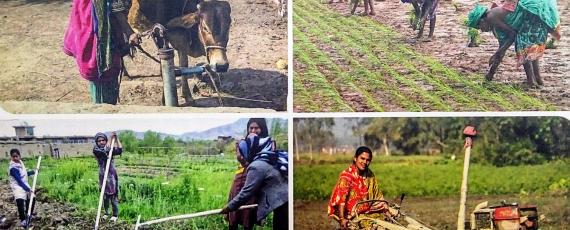Value of collaborative research crossing boundaries

Across the world, women form an integral part of the agricultural sector. In much of South Asia, women make-up a majority of the agricultural workforce, but the extent of their contribution remains unacknowledged in policy and public debates. They often undertake difficult physical labour - working long hours, and are paid lower wages compared to their male counterparts - if they are paid at all.
LANSA research identified women’s agricultural work in South Asia as a critical mediating factor between household poverty and undernutrition. The recognition of their work and women themselves as agricultural workers were identified as key entry points to leverage agriculture for improving nutrition.
In India and Pakistan, LANSA has already made a significant contribution to national debates and policy thinking on women agricultural workers. The ANH Academy Week in Kathmandu in 2017 offered an opportunity for taking this dialogue to the regional level. The advantages were clear. Despite many differences across the region – even within countries like India and Pakistan– there are many common strands that cross a nation’s boundaries. The LANSA programme shows the value of collaborative research that can work beyond these boundaries. More researchers working on related issues have adopted comparable approaches and discovered similar findings. The diverse shared experience of engagement with policy and political processes across countries holds promise for greater unanimous decision-making.
Towards a new regional agenda: bringing visibility to rural women in South Asia
In 2018 LANSA formed a partnership with UN Women- an influential global and regional stakeholder, to co-host a regional roundtable on ‘Recognising the Rights of Women Agricultural Workers in South Asia: Roundtable on Policy, Politics and Impact’. This was heldin Bangkok in October 2018 bringing together diverse group of stakeholders from Bangladesh, India, Nepal, Pakistan and Sri Lanka, including policymakers, representatives from governments, universities and research institutions, international organizations, civil society organisations and grassroots activists.
The roundtable provided an exciting opportunity for sharing research findings and policy engagement experiences, and brought forward a new regional agenda casting spotlight on the rights of rural women. A statement of joint recommendations was adopted and consensus was to bring transformative change in the lives of women agricultural workers. The statement encapsulates a set of action recommendations to focus on policy, legal and programmatic changes so as to recognise, protect and promote the rights of women agricultural workers. It mirrors the voice of rural women excluded from several policy dialogues and lays out a range of provisions, which women should receive from governments.
Legal recognition of women agricultural workers must be seen as a starting point leading to:
i) ensuring equal and living wages rights,
ii) provision of social protection in the form ofpensions, housing, childcare, free and quality healthcare that includes sexual reproductive health, education and maternity entitlements are established and enforced.
Policymakers, governments of all tiers, international agencies, local and community-based organisations, communities and women agricultural workers themselves must become a part of this regional agenda for women’s rights and benefits to be realised. Women agricultural workers’ voices need to be amplified across different for a – local, national and international. Recognising these urgent needs, a strong component of the joint statement was the need to mobilise women agricultural workers, provide them a platform for discussion and articulation of their needs and demands - given the near-total absence of such platforms (unions, associations or other forms of organisation). The regional roundtable is one major step towards recognising the contribution of women agricultural workers - energy and commitment for continued engagement with the issue is pledged.








Add new comment